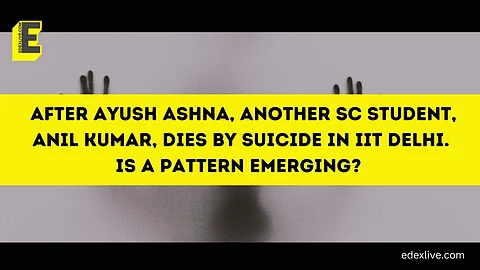

An SC (scheduled caste) student's death at the Indian Institute of Technology (IIT) Delhi, on Friday, September 1, is hinting at issues of casteism and stringency in the curriculum yet again, which is allegedly driving these students to resort to such extreme measures.
The deceased, who has been identified as Anil Kumar, was a twenty-one-year-old SC student who was pursuing BTech in Mathematics and Computing for the session 2019-2023.
What took place?
The students of IIT Delhi received an email from the director's office on Friday, September 1, at around 11 pm at night, which relayed information on the untimely demise of a student, Anil Kumar, who was a resident of the Vindhyachal Hostel of the institution.
The email further added that Anil was discovered hanging in his room, on Friday evening, which was locked from inside.
"This tragic loss is also compounded by the fact that Anil belonged to the SC community," the mail read, which was an acknowledgement of the student's background.
Is there a pattern?
On Sunday, July 9, Ayush Ashna a final year BTech student allegedly died by suicide and was found dead in his hostel room at IIT Delhi. He too, was a final year student at the Department of Mathematics and Computing, and hailed from the same community as Anil Kumar.
As per the police, Kumar was unable to score passing grades for a few subjects and hence, was on an extension. As a result, he was allowed to reside in the hostel on a six-month extension. Ashna, too, was on a study extension as he failed to clear some of his papers in order to receive his degree.
Both suicides took place in the span of two months.
"It has come to notice that after Ayush Ashna's death, the administration did not do anything and did not reach out to the students either, this is institutional neglect," alleged a member of Ambedkar Phule Periyar Study Circle (APPSC) from IIT Bombay, while speaking to EdexLive.
The student further points out that such esteemed institutions lack professors from SC and ST (Scheduled Tribe) communities. "The lack of proper representation of faculty from minority communities is not only a blow to these institutions that promise an equitable atmosphere but minority students too fail to correlate to such an environment and hence, alienate themselves."
He further adds that the availability of teachers from minority communities could have been a channel to establish some common grounds and facilitate an exchange of information between students from the community and professors, providing a semblance of connection, or even solace, for the former.
APPSC Bombay, via their X handle (@AppscIITb), posted information retrieved via an RTI. This states that at IIT Delhi, 14 departments have no SC/ST faculty, 24 departments have no ST faculty, 15 other departments have no SC faculty and nine departments have no OBC faculty.
Additional data (as of August 15, 2023) shared by their X handle shared data on the number of professors employed at the institution, gender-wise and category-wise. According to the data, the department Ayush and Anil were in had no professors from the SC/ST community and employed a total of five assistant professors from the OBC category.
SC/ST cell; what about it?
A notification released by IIT Delhi on March 16, 2023, named the newly constituted members of the institution, a total of nine members comprising only one student and several others who were a part of different departments of the institution. The fact that a cell working for the wellness of the students can constitute only one member as a representative of the said students can also be up for scrutiny.
One of the functions of the cell, as per the notification, is, "To operate a Grievance Redressal Cell for the grievances of SC/ST and OBC students and employees and render them necessary help in solving their academic and administrative problems." A clear function of the cell is delineated here as it vouches to properly address the problems of the students of the minority community.
A tweet by the APPSC IIT Bombay reads as follows, "Why are IITs becoming graveyards for students from marginalised communities. Both @iitbombay and @iitdelhi have SC/ST cells, yet both fail to implement reservation or protect the students."
